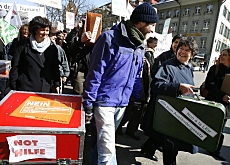
New foreigner and asylum laws challenged

Swiss voters will have the final say on the tough new asylum and foreigners laws approved by parliament last year.
A coalition of leftwing parties, churches and charities handed in more than 160,000 signatures against the laws to the Federal Chancellery on Thursday.
The number of signatures collected in both cases was far above the required 50,000 to force a referendum: 121,794 were gathered against the asylum law and 74,246 against the foreigners legislation.
This means that each law will be subject to a nationwide vote later this year. The date will be decided by the government.
The “Coalition for a Humanitarian Switzerland”, a group of more than 30 organisations, is headed by former Interior Minister Ruth Dreifuss. It has the support of the centre-left Social Democrats and the Green Party.
Humanitarian tradition
Jürg Krummenacher, head of the Catholic charity Caritas, said the high number of signatures collected against the asylum law showed that a large section of the population considered the law to be against Swiss humanitarian tradition.
The new measures include rejected asylum seekers no longer receiving social welfare payments and the dropping of admission to those who could not provide valid identity papers within 48 hours.
Also criticised was the raising of maximum detention for foreigners awaiting deportation to 18 months.
Dreifuss said it was unacceptable to treat people “like criminals” who had simply dreamt of a better future.
Last year the United Nations refugee agency (UNHCR) also voiced “serious concerns” about moves to introduce a more restrictive asylum law.
The new legislation was masterminded by Justice Minister Christoph Blocher of the rightwing Swiss People’s Party and supporters believe it will provide better protection against abuse of the asylum system.
Foreigners law
As for the law on foreigners aimed at regulating the admission and residence of non-European Union and European Free Trade Association (Efta) nationals who are not asylum-seekers, Dreifuss said that the needs of the economy could not be met if non-European and unqualified workers were excluded from Switzerland.
She said these workers carried out valuable domestic work in households and institutions, allowing more women to work and the elderly to remain in their houses instead of moving to old people’s homes.
The law is likely to force these workers to become asylum seekers or to go underground, she added.
Another criticism was that the law would make it harder for temporary residence permit holders and foreign spouses to bring family members into the country, thus making integration harder.
The People’s Party said the referendums would allow people to have their say on the issues. But, unlike the coalition, it is counting on a double acceptance of the new laws.
swissinfo with agencies
The new law on foreigners favours EU and Efta nationals and limits the migration of non-European and unqualified workers.
The migration of family members also becomes harder.
Under the asylum law, asylum seekers no longer receive social welfare payments and the maximum detention for foreigners awaiting deportation has been raised to 18 months.
The granting of admission on humanitarian grounds has been ruled out. But it has been made easier for those granted asylum to be joined by their families and to work.
Both laws were approved by parliament last December.
121,794 signatures were gathered against the asylum law.
74,246 against the foreigners law.
The coalition had 100 days to collect the 50,000 signatures needed to force a referendum.

In compliance with the JTI standards
More: SWI swissinfo.ch certified by the Journalism Trust Initiative

























You can find an overview of ongoing debates with our journalists here . Please join us!
If you want to start a conversation about a topic raised in this article or want to report factual errors, email us at english@swissinfo.ch.